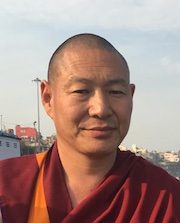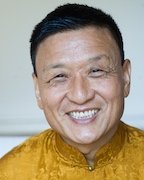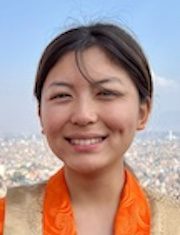Sep 18, 2022
A live online conversation with Khenchen Tsultrim Nyima of the Kagyu school of Tibetan Buddhism and co-hosts Geshe Tenzin Wangyal and Jhama Lhamo. Conversation is in Tibetan language only.
The major Buddhist traditions of Tibet have distinctly different teachings and rituals, yet they also share many commonalities, among them the jewel-like teachings of the Five Wisdoms. In Part 6 of an ongoing series of live online broadcasts, our panelists go deeper into the previous discussions — dialogs between esteemed teachers of six Buddhist traditions of Tibet — to further clarify the essence of these ancient teachings.
View on Facebook to join the chat.
About the Five Wisdoms
Many ancient Tibetan traditions refer to wisdom according to five characteristic aspects known as the five wisdoms. For example, the Yungdrung Bön tradition describes wisdom as a state of open awareness that is absent of ego identity, or the mistaken belief in one’s own inherent existence; and it refers to the five wisdoms as the wisdom of emptiness, mirror-like wisdom, wisdom of equanimity, discriminating wisdom and all-accomplishing wisdom. In each broadcast of the series, invited presenters will each present the teachings according to their own tradition’s unique perspective, quoting from original texts and offering commentary and heart advice.
Full Schedule
- April 30, 2022: Part 1 (six teachers, introduction to the Five Wisdoms) — view recording
- June 16, 2022: Part 2 (Bön teacher’s perspective) — view recording
- June 25, 2022: Part 3 (six teachers, Mirror-Like Wisdom) — view recording
- July 21, 2022: Part 4 (Nyingma teacher’s perspective) — view recording
- August 20, 2022: Part 5 (six teachers, Wisdom of Equanimity) — view recording
- September 18, 2022: Part 6 (Kagyu teacher’s perspective). View above on this page.
- November 5, 2022: Part 7 (six teachers, Discriminating Wisdom) — view recording
- December 17, 2022: Part 8 (Sakya teacher’s perspective) — view recording
- February 26, 2023: Part 9 (six teachers, All-Accomplishing Wisdom & Wisdom of Emptiness) — view recording
About the Panelists
 མཁན་ཆེན་ཚུལ་ཁྲིམས་ཉི་མ།
མཁན་ཆེན་ཚུལ་ཁྲིམས་ཉི་མ།
Khenchen Tsultrim Nyima (Kagyu) studied Buddhist philosophy for 30 years in Tibet and India. He is currently head teacher for Nalanda Institute of Rumtek Dharma Chakra Centre in Sikkim, India, the Kagyu tradition’s primary high institution for Buddhist dialectics.
མཁན་པོ་ཚུལ་ཁྲིམས་ཉི་མ་ནི། བོད་དང་རྒྱ་གར་སོགས་སུ་རིས་མེད་ཆོས་སྡེ་ཁག་ཏུ་ལོ་སུམ་ཅུ་ལྷག་ཙམ་ལ་ནང་ཆོས་ལ་སློབ་སྦྱོང་བྱས། ད་ལྟ་ཀརྨ་པའི་བྱེས་ཀྱི་གདན་ས་འབྲས་ལྗོངས་རུམ་བཏེག་དགོན་དུ་མཁན་པོའི་མིང་ཐོག་ནས་སློབ་ཁྲིད་བྱེད་བཞིན་མཆིས་སོ།།
 Geshe Tenzin Wangyal Rinpoche (co-host) was born in India in 1961, following his parents’ journey from Tibet to India in 1959. At age 11 he began formal studies as a monk at Menri Monastery near Dolanji, India, where he completed an 11-year course of traditional studies at the Bön Dialectic School. He was awarded his geshe degree in 1986. He now lives as a householder, and has been living and teaching in the West for more than 30 years. An accomplished scholar in all aspects of sutra, tantra and dzogchen, Rinpoche is an acclaimed author and a respected teacher of students worldwide. As the founder and spiritual director of Ligmincha International, Rinpoche has established numerous centers and institutes of learning in the United States, Mexico, South America, Europe and India. Fluent in English, he regularly offers online teachings in the form of live webcasts, online workshops and YouTube videos. He is renowned for his depth of wisdom; his clear, engaging teaching style; and his dedication to making the ancient Tibetan teachings highly accessible and relevant to the lives of Westerners. More about Tenzin Wangyal Rinpoche
Geshe Tenzin Wangyal Rinpoche (co-host) was born in India in 1961, following his parents’ journey from Tibet to India in 1959. At age 11 he began formal studies as a monk at Menri Monastery near Dolanji, India, where he completed an 11-year course of traditional studies at the Bön Dialectic School. He was awarded his geshe degree in 1986. He now lives as a householder, and has been living and teaching in the West for more than 30 years. An accomplished scholar in all aspects of sutra, tantra and dzogchen, Rinpoche is an acclaimed author and a respected teacher of students worldwide. As the founder and spiritual director of Ligmincha International, Rinpoche has established numerous centers and institutes of learning in the United States, Mexico, South America, Europe and India. Fluent in English, he regularly offers online teachings in the form of live webcasts, online workshops and YouTube videos. He is renowned for his depth of wisdom; his clear, engaging teaching style; and his dedication to making the ancient Tibetan teachings highly accessible and relevant to the lives of Westerners. More about Tenzin Wangyal Rinpoche
 Jhama Lhamo (co-host) of Solan, India, completed her high school education at Tibetan Children’s Village School in Bangalore, South India. She is now pursuing her bachelor of pharmacy degree at Shoolini University, Himachal Pradesh, India.
Jhama Lhamo (co-host) of Solan, India, completed her high school education at Tibetan Children’s Village School in Bangalore, South India. She is now pursuing her bachelor of pharmacy degree at Shoolini University, Himachal Pradesh, India.

I would like to be join to this beautiful people. Namaste
Feeling disappointed after reading such wonderful description of the dialogs to find that they are in Tibetan only.
Sorry Christopher. Usually we are lucky enough to find a volunteer to translate simultaneously from Tibetan to English, but it couldn’t happen this time.